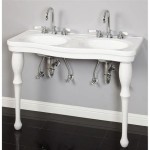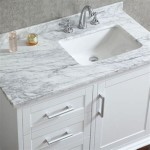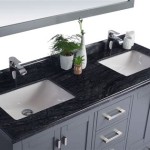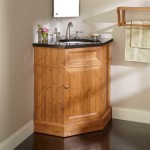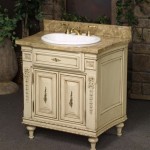Make Your Own Bathroom Vanity Cabinet: Essential Aspects
Exploring the essential aspects of building your own bathroom vanity cabinet is crucial for executing this project successfully. Understanding these factors empowers you with the knowledge to make informed decisions, ensuring both the aesthetics and functionality of your finished product. This article delves into the key aspects to consider, providing valuable insights for a seamless and rewarding experience. ### Planning and Design: The foundation of a successful vanity cabinet lies in meticulous planning and design. Determine the dimensions and layout of your cabinet, considering the available space and your desired storage needs. Sketch out a detailed plan, including the placement of drawers, shelves, and doors. Choose durable materials that complement your bathroom's design, ensuring longevity and aesthetic appeal. ### Materials and Tools: Selecting the right materials and tools isessential for building a sturdy and functional vanity cabinet. Opt for moisture-resistant materials like plywood or MDF for the cabinet's base. Choose durable hardware, such as hinges, drawer slides, and handles, to ensure smooth operation. Gather essential tools like a saw, drill, screwdriver, level, and measuring tape for precise construction. ### Assembly and Construction: Follow the assembly instructions carefully, ensuring precision and alignment. Assemble the cabinet's sides, top, and bottom, securing them with screws or nails. Install the drawers and shelves, ensuring they glide smoothly and support the desired weight. Attach the doors, aligning them evenly and adjusting the hinges for a perfect fit. ### Finishing and Customization: The finishing touches can transform a basic cabinet into a statement piece. Sand the surface before applying primer and paint or stain in your desired color. Consider adding decorative elements like molding, trim, or hardware to enhance the cabinet's style. Seal the finish with a protective coat to ensure durability and resistance to moisture. ### Plumbing and Electrical: If your vanity cabinet will include a sink, you must consider plumbing and electrical aspects. Consult a professional plumber to connect the water supply and drain. Hire an electrician to install any necessary electrical outlets or lighting fixtures, ensuring safety and functionality. ### Installation and Mounting: Securely install the vanity cabinet against the wall, using appropriate mounting hardware. Level the cabinet and adjust the legs or supports to ensure stability. Connect the plumbing and electrical fixtures, following the manufacturer's instructions and adhering to local codes and standards. ### Maintenance and Care: Maintaining your vanity cabinet will prolong its life and preserve its appearance. Regularly clean the surfaces with a mild detergent and dry them thoroughly. Check hardware periodically, tightening loose screws or replacing worn parts. Protect the finish from moisture and spills to maintain its integrity over time.:max_bytes(150000):strip_icc()/build-something-diy-vanity-594402125f9b58d58ae21158.jpg?strip=all)
16 Diy Bathroom Vanity Plans You Can Build Today

Build Your Own Bathroom Vanity Fine Homebuilding

How To Build Your Own Bathroom Vanity Fine Homebuilding

10 Diy Bathroom Vanity Ideas The Family Handyman

Diy Bathroom Vanity 12 Rehabs Bob Vila
:max_bytes(150000):strip_icc()/diy-bathroom-vanity-594406a93df78c537ba769dc.jpg?strip=all)
16 Diy Bathroom Vanity Plans You Can Build Today

How To Build Your Own Bathroom Vanity Fine Homebuilding

Diy Bathroom Floating Vanity With Drawers Hydrangea Treehouse
:max_bytes(150000):strip_icc()/mylove2create-5b325e5c46e0fb0037a89f15.jpg?strip=all)
16 Diy Bathroom Vanity Plans You Can Build Today

Guide To Selecting Bathroom Cabinets
Related Posts
